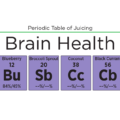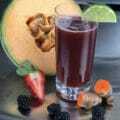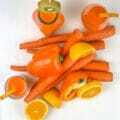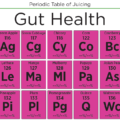Ilene S. Ruhoy, MD, Ph.D.
CAVEAT: If you are experiencing feelings of wanting to hurt yourself or others, please seek professional medical guidance. This blog does not constitute medical advice in any way.
There is a lot of research on mental health and ways to manage our feelings of anxiety, sadness, and irritability. Research shows exposure to nature, good sleep hygiene practices, connecting with family and friends, and exercise can be important tools to help manage these feelings. Research also shows that what we eat can play an important role. Healthy food choices include a wide variety of phytonutrients including antioxidants that help improve neurotransmitters. Serotonin and dopamine -balance hormones, decrease pain, improve mental clarity, and repair gut dysfunction. Gut dysfunction also helps with the communication chain to our brain and changes the way our brain works biochemically. Fennel is a great addition to any juices mentioned for neurotransmitters as it increases gut metabolites for serotonin.
Magnesium is an element that is crucial to our mental health as it can stabilize the vessel’s delivery of blood to our brain and decrease pain. Magnesium can be found in spinach, bananas, potatoes, avocados, grapefruits, flaxseeds, Brussel sprouts, and swiss chard. Healthy fats are also important to maintain the integrity of our brain’s cellular structure for optimal neurotransmitter production and can be found in blueberries, coconut, brassica vegetables (Brussel sprouts, cabbage, broccoli, etc.), squash, and dark leafy greens such as spinach and kale.
Your neurotransmitters balance your hormones for more optimal management of anxiety, irritability, sadness, and impatience. The two main neurotransmitters for a positive state of mind are serotonin and dopamine. Tryptophan is a precursor to serotonin. Phenylalanine is a precursor to tyrosine and tyrosine is a precursor to dopamine – all necessary for optimal neurotransmitter balance of these happy molecules, so feed your body what it needs. Find your tryptophan (serotonin) from broccoli, dark leafy greens, green beans, and snow peas. Eat your serotonin directly from pineapple, tomatoes, kiwifruit, and mangoes. Sweet potatoes will give you optimal amounts of phenylalanine (ultimately dopamine). Consume your tyrosine (dopamine) from beets, spinach, green beans, jackfruit, cauliflower, and garlic. Get your dopamine directly from blueberries, bananas, strawberries, turmeric, and plums.
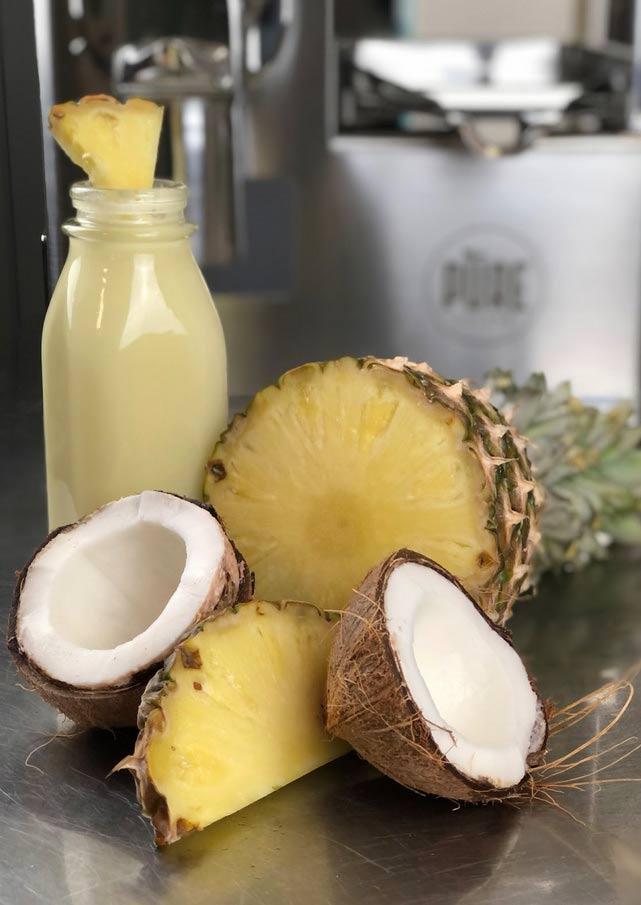
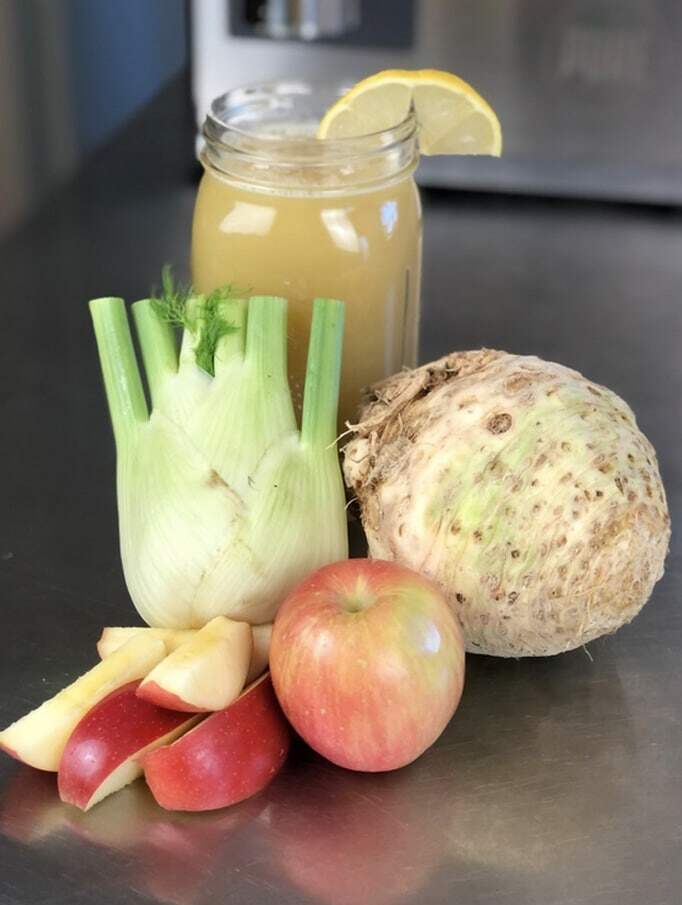
High intake of these foods will provide the phytonutrients to improve your general and mental well-being, quality of life, sleep, self-esteem, and resiliency to better handle, or at least understand, your emotions and reactivity to internal and external stressors in life.
Mental health really is everything! We all know this, and we know how to support it with exceptional nutrition. Sometimes, we simply need a reminder of the right foods and the right juices to prepare for our most positive and happy life. Juicing is a superb way to get these essential concentrated nutrients into our bodies first thing in the morning. When you begin your day with these recommendations, you absolutely improve your chances of a successful day.
JUICE RECIPE RECOMMENDATIONS
(pictured above and below):
Pineapple – Coconut Mylk
1 Mature Coconut
1 Pineapple
Makes 48 oz
Apple – Fennel – Celeriac – Lemon
6 Apples
1 Fennel Bulb
1 Celeriac Root
1 Lemon
Makes 48 oz
Grapefruit – Turmeric
4 Grapefruit
1 – 3” Turmeric
Makes 24 oz
Our collective mental health is suffering. In our modern world, we have so much to think about daily and often our overall health takes a backseat. Usually, the first to suffer the consequences is our mental health. We feel anxious and fearful and sad. We become irritable and moody. These changes in our disposition can disrupt our sleep, relationships, and sense of motivation and optimism. It can affect how we feel about ourselves and our sense of connection to others, as well as our ability to manage our emotions and our reactions to stressful events. Mental health influences how we see the world, and even how the world sees us. We can experience difficulty navigating the complex events of life.
It is important to note that there is a normal, and arguably a healthy dose of anxiety and fear that comes with life. It is the kind of anxiety that helps us accomplish things. It forces us to focus and get things done. If we did not feel slightly anxious over good outcomes – be it school, work, or within relationships – then how would we reward a job well done? The feeling of accomplishment is often greatly appreciated in the context of the “pre-performance” nervousness we feel. A healthy mental state includes insight into what triggers us, what sends us into a state of worry, and how we manage our moods and reactivity to people and events around us. It also includes the ability to learn from our past experiences of anxiety, panic, fear, and sadness relating to certain events and as time goes on, those events become less of a trigger because we learn what we are capable of and how best to manage those emotions.
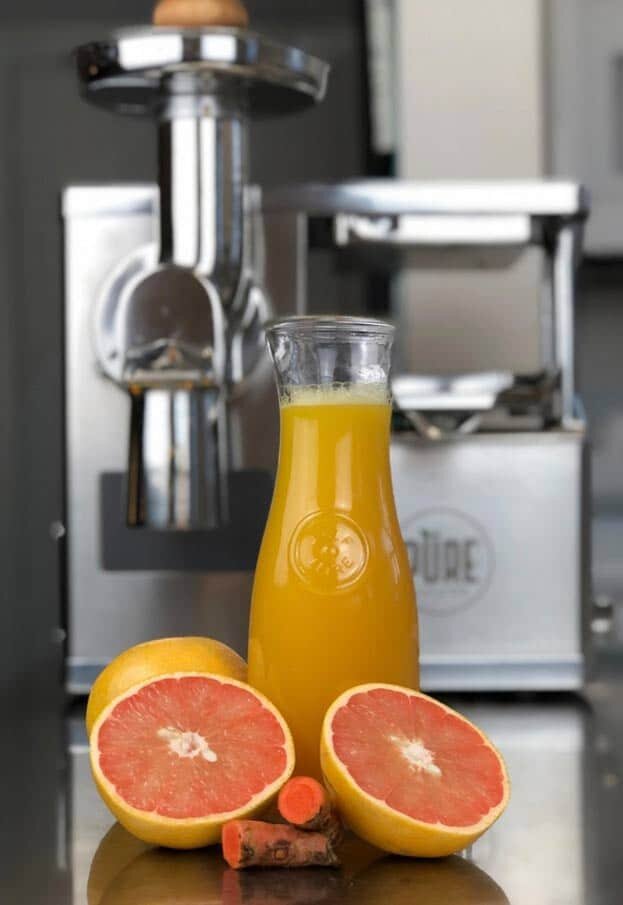
However, anxiety and fear can also be debilitating for some and that is not the healthy kind. Sometimes we are unable to see the lessons from past experiences and are unable to approach them differently. The feelings of anxiety, fear, and sadness can worsen. It can lead to depression and poor choices. It can make us want to avoid those feelings and self-medicate with food, drugs, alcohol, or even just wallow in self-hatred and despair, leading to lower quality of life and less chance of success.
We invite you to add juice to your day…a daily dose of joy for your body and mood! Let us know what you juice this month and if you notice any change in your energy, mood, or even interactions with people.
In our next blog, we will talk about musculoskeletal health. We will dive into what our muscles and skeletal system love us to juice to stay strong and recipes that keep our systems revved all season long.
Read other blogs about the Periodic Table of Juicing, and don’t forget, we are juicing new recipes live on Instagram regularly. Join us!
References:
Brookie KL, Best GI, Conner TS. Intake of raw fruits and vegetables is associated with better mental health than intake of processed fruits and vegetables. Front Psychol. 2018 Apr 10:9;487.
Gehlich KH, Beller J, Lange-Asschenfeldt B, et al. Consumption of fruits and vegetables: improved physical health, mental health, physical functioning and cognitive health in older adults in 11 European counties. Aging Ment Health. 2020 Apr;24(4):534-641.
Glabska D, Guzek D, Groele B, Gutkowska K. Fruit and vegetable intake and mental health in adults: a systematic review. Nutrients 2020 Jan 1;12(1):115.
Glabska D, Guzek D, Groele B, Gutkowska K. Fruit and vegetable intake in adolescents and mental health: a systematic review. Nutrients 2020 Jan 1;12(1):15-25.
Leri M, Scuto M, Ontario ML, et al. Healthy effects of plant polyphenols: molecular mechanisms. Int J Mol Sci. 2020 Feb 13;21(4):1250.
Martinez-Gonzalez MA, Sanchez-Villegas A. Food patterns and the prevention of depression. Proc Nutri Soc. 2016 Mayl75(2):139-46.

